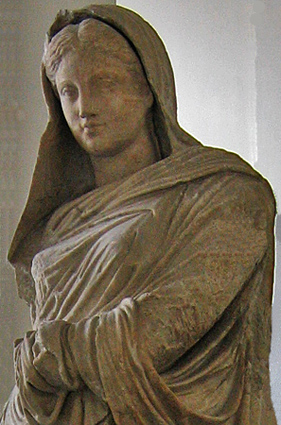
Veiled woman, Magnesia, 1st century BCE
Pompeia Paulina (fl. 1st century CE) was a member of the gens Pompeia, a powerful family during the Republic whose prominent members included Pompey the Great. She was the daughter of Pompeius Paulinus, who held significant military and civil appointments between 48-58 CE. Paulina may have been the only wife of the philosopher-statesman Seneca the Younger (c.4 BCE-65 CE); no source mentions a previous wife, but it is strange that Paulina is not mentioned in the consolation Seneca writes to his mother during his exile (41-49 CE). If she was his only wife, they were married by 42 CE, the year he published the first passage that mentions his wife (De Ira 3.36.3), and she was the mother of the son mentioned in Ad Helviam 2.5. What seems certain is that she was decades younger than he, a situation which was quite common in Roman marriages, and that their relationship was deeply affectionate; in one letter Seneca notes how concerned Paulina was for his health and that "her life-breath is turned around into mine" (spiritum illius in meo verti, Epistulae morales 104.2). That she had internalized Seneca's moral commitment to a life of honor is demonstrated by her offer to die with him when he was commanded to commit suicide by the Emperor Nero in 65 CE for his reputed involvement in the Pisonian conspiracy. Tacitus records that whereas a centurion was sent by the emperor to oversee Seneca’s end, Nero ordered Paulina’s wounds to be bound up so as not to increase his reputation for cruelty by being the cause of her innocent death. Tacitus' narrative includes the gossip that questioned the bravery of her act by claiming that Paulina was glad to be spared once she knew the emperor's intentions, as the attractions of life outweighed a glorious death. Cassius Dio, the 2nd century CE historian, offers a variant with a similar effect: that Seneca opened Paulina’s veins because he wished to end her life with his and that she only survived because he died before her (Roman History 62.25). Paulina never remarried and bore the physical consequences of her near-suicide to her grave (see Vnivirae). For further information on female suicides as protests in the Neronian period, see Gilespie (2021) in the Bibliography.
15.63 (1) Ubi haec atque talia velut in commune disseruit, complectitur uxorem, et paululum adversus praesentem fortitudinem mollitus rogat oratque temperaret dolori [neu] aeternum susciperet, sed in contemplatione vitae per virtutem actae desiderium mariti solaciis honestis toleraret. illa contra sibi quoque destinatam mortem adseverat manumque percussoris exposcit.
15.63 (2) tum Seneca gloriae eius non adversus, simul amore, ne sibi unice dilectam ad iniurias relinqueret, "vitae" inquit "delenimenta monstraveram tibi, tu mortis decus mavis: non invidebo exemplo. sit huius tam fortis exitus constantia penes utrosque par, claritudinis plus in tuo fine." post quae eodem ictu brachia ferro exsolvunt.
15.63 (3) Seneca, quoniam senile corpus et parco victu tenuatum lenta effugia sanguini praebebat, crurum quoque et poplitum venas abrumpit; saevisque cruciatibus defessus, ne dolore suo animum uxoris infringeret atque ipse visendo eius tormenta ad impatientiam delaberetur, suadet in aliud cubiculum abscedere.
15.64 (2) cui addidit paucos postea annos, laudabili in maritum memoria et ore ac membris in eum pallorem albentibus, ut ostentui esset multum vitalis spiritus egestum.
Click on the underlined words for translation aids and commentary, which will appear in a small window.